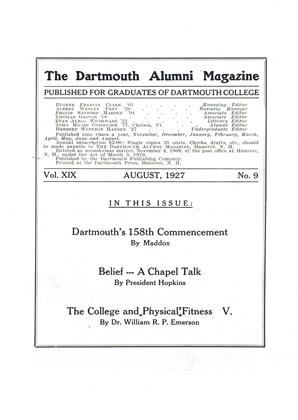During the Commencement season Mr. and Mrs. E. K. Hall opened Dick's House to the members of the graduating class and the alumni and friends of the College. On Friday afternoon the senior class visited the1 house and later the trustees of the College and the class of 1892. After that the house was open at intervals during the whole of the Commencement season and between three and four thousand alumni and friends took the opportunity to visit the house and become acquainted with its unusual opportunities and purposes. In a later issue of the MAGAZINE a detailed description of the house will appear.
In the Inter-Company News Bulletin of May 21, published in Chicago, appeared an article on Dick's House which so completely reveals the spirit of the memorial erected by Dick's parents that the ALUMNI MAGAZINE has desired to reprint it for the benefit of its readers. The article follows:
Richard Drew Hall
Through a fellow with whom we work daily, we have come to know Dick Hall. Though that which was mortal of Dick Hall had ceased to walk the paths of this earth ere our knowledge of him came, those same paths are finer for us in our pilgrimage over them because of the new acquaintanceship . . .
For Dick Hall still lives, and beautifully—as beautifully as had his young heart not stopped beating. In a setting he adored, his spirit and his personality dominate in perpetual youth a great house.
Dick Hall, Dartmouth student, died in 1924. His father and mother, in his memory, are building at Hanover a house for him; a house in which he will take care, in gracious surroundings, of undergraduates ill or indisposed. Much could be written of this house—of the patient, loving care that has been given by everyone honored in association with its erection, from the parent-donors to the least workmen ; of its library, given by Dick's friends and his family's friends, each volume carrying a fly-leaf inscription telling why it has been placed there. A library, truly, with "heart and .soul" . . .
Yet much has already been written of these things. They have been well told. It is enough, here, to talk only of the Dick Hall who is, and to leave the story of the Dick Hall who was and of Dick Hall's House which will be to other and more capable hands . . .
As long as there is Dartmouth, the youth who laughed and worked and played in her academic shade will live. Other youths who laughed and worked and played with him will go on in the world and at last go out of it for reunion with Dick in some pleasant place beyond the stars. They will be prouder of their classmate then than now; an envious pride, for he will have for his own the unable-to-be-shared joyousness of his work as head of his houseas host forever to the company he loved, the men of Dartmouth.
Aye, they will envy him his eternal, earthbound life, just as we, who love life completely, even now envy him. For we know that in the end, Life will break our heart, and the warmth of the sun will no longer matter, and the stars will lose their challenge and their inspiration, and youth will give way to age, and the honest friendships of youth will be no more. And we know that the Master of Dick Hall's House will always cherish the sun for comforting his guests; will always love the stars that offer their benedictions at night to the generations that his roof shelters; will always fellow in his home with youth in the glorious comradeship of spring . . .
We may never see the house in which Dick Hall lives in Hanover. But it is enough that we know that it is there and that he is there. It is enough to know that he is young and clean and fine, and that his young and clean and fine spirit will companion with boys who are sick in mind and soul and body until Dartmouth is no more.
Enough for what? Ah, well, enough, as was written, to make Life a braver adventure for us; to sustain belief in the destination where Dick Hall has already found his infinite labor in the House of One to whom his earthly house, in concept, is dedicated.
For in Dick's house, also are many mansions . . .
 View Full Issue
View Full Issue
More From This Issue
-
 Article
ArticleDARTMOUTH'S 158TH COMMENCEMENT
August 1927 -
 Article
ArticleTHE COLLEGE AND PHYSICIAL FITNESS V.
August 1927 By William R. P. Emerson, M. D., -
 Article
ArticleJUNE MEETING OF ALUMNI COUNCIL
August 1927 By J. R. Chandler '98, Clarence G. McDavitt '00 -
 Article
ArticleTRUSTEES HOLD MEETING IN HANOVER
August 1927 By Hanover, N. H.,, E. K. Hall -
 Sports
SportsSUMMARY OF ATHLETIC SCORES
August 1927 -
 Class Notes
Class NotesCLASS OF 1921
August 1927 By Herrick Brown
Article
-
 Article
ArticleMUSICAL CLUBS SCORE HIT ON EASTER TOUR
May, 1923 -
 Article
ArticleCoaches' Corner ...
April 1961 -
 Article
ArticleBoston Dinner
FEBRUARY 1969 -
 Article
ArticleThe Undergraduate Chair
November 1937 By Ben Aes Williams Jr. '38. -
 Article
ArticleGreen Jottings
February 1951 By Cliff Jordan ‘45 -
 Article
ArticleSWIMMING
March 1950 By Francis E. Merrill '26


